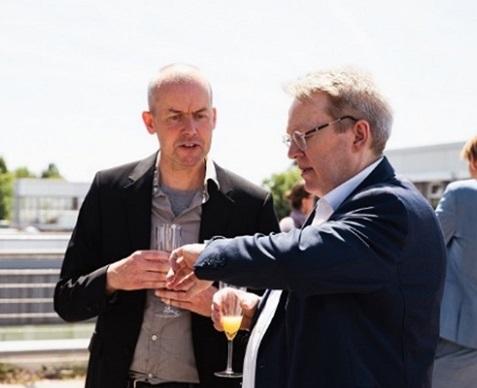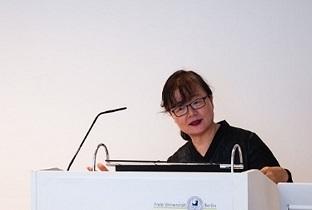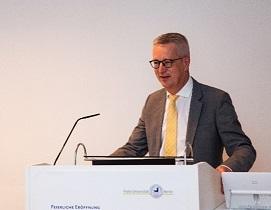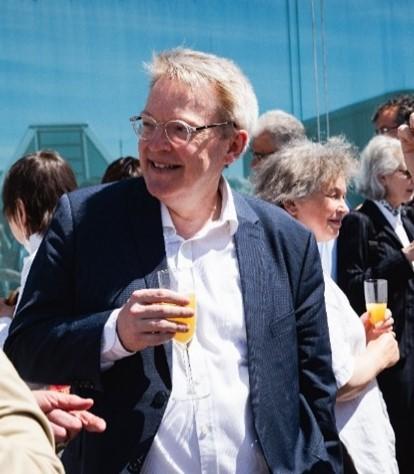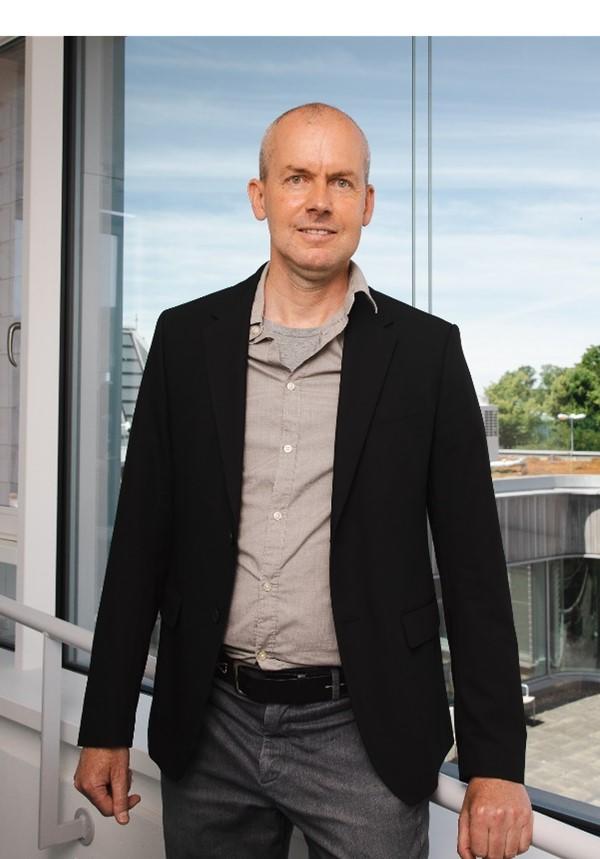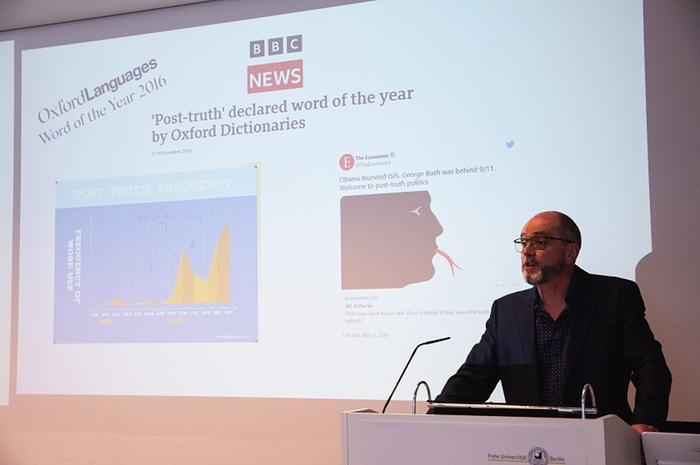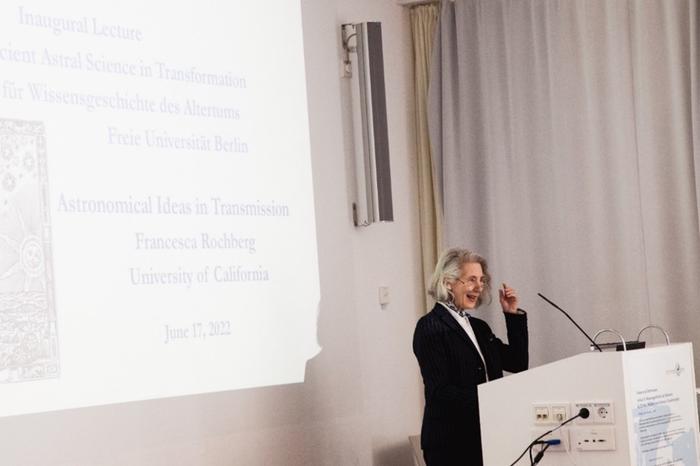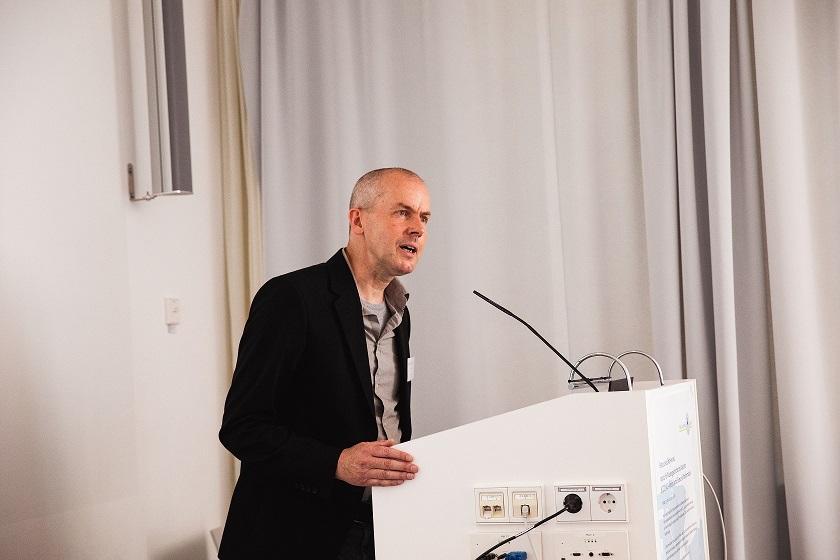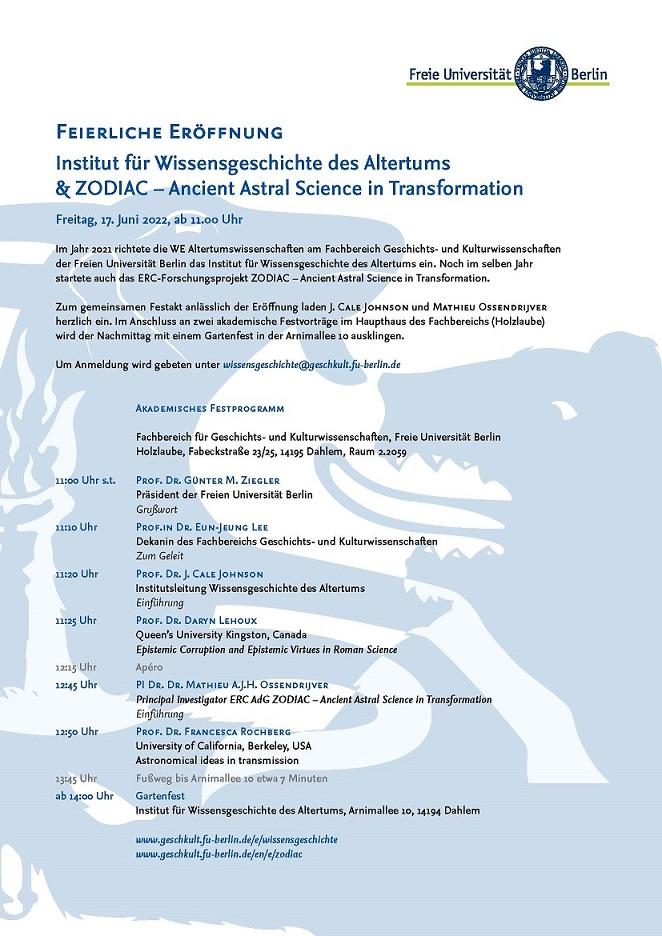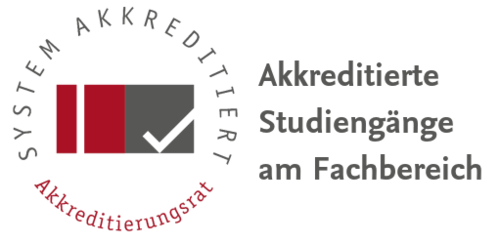Inauguration of the Institute for the History of Knowledge in the Ancient World and the ERC-project ZODIAC
The convenors: Mathieu Ossendrijver, Prof. of the History of Science in the Ancient Orient (left) and Prof. J. Cale Johnson, Prof. of the History of Knowledge in the Ancient World (right)
Image Credit: Lorenz Brandtner
Prof. Dr. Eun-Jeung Lee, Dean of the Department of History and Cultural Studies
Image Credit: Lorenz Brandtner
Prof. Dr. Günter M. Ziegler, President of the Freie Universität Berlin
Image Credit: Lorenz Brandtner
Head of the Institute J. Cale Johnson
Image Credit: Lorenz Brandtner
Mathieu Ossendrijver, Principal Investigator of the ZODIAC-Project
Image Credit: Lorenz Brandtner
Opening lecture by Daryn Lehoux, Professor of Classics and Philosophy at the Queen’s University, Canada
Image Credit: Lorenz Brandtner
Opening lecture by Francesca Rochberg, Professor of Near Eastern Studies at the University of California, Berkeley, USA
Image Credit: Lorenz Brandtner
On Friday, June 17, 2022, the opening ceremony of the Institute for the History of Knowledge of Antiquity and the ERC research project ZODIAC – Ancient Astral Science in Transformation took place at the Department of History and Cultural Studies at Freie Universität Berlin. The head of the institute, J. Cale Johnson, and Mathieu Ossendrijver, head of the first research project based at the institute, ZODIAC, invited guests to lectures in the Holzlaube, followed by a reception in the garden of the institute's villa, Arnimallee 10.
Prof. Dr. Günter M. Ziegler, President of the Freie Universität Berlin, gave an opening welcome, emphasizing what the investigation of knowledge and knowledge formation will gain from a historical perspective at the university. The President also referred to the institute’s broad transdisciplinary and transcultural research focus. This aspect was highlighted in an address by Prof. Dr. Eun-Jeung Lee, Dean of the Department of History and Cultural Studies. She emphasized the unique orientation of the institute, which will play a key role in promoting cooperation between scholars of the various subjects represented in the faculty.
In his opening speech, J. Cale Johnson described the character of the institute as a “think tank” connecting disciplines. The institute is a link between disciplines within classical studies (philology and archaeology) and also in a larger sense between the humanities and natural sciences, including mathematics. In addition, it aims to promote the study of all forms of knowledge, regardless of time-frame, geography, or medium of transmission. Its members hope to locate in antiquity both the first philological traditions and non-written forms of knowledge, such as in archaeology and art history. The program of research questions includes how discursive and non-discursive forms of knowledge interact in ancient societies and how a broad notion of science and technology studies might make sense of these different forms of knowledge.
With the opening of the institute, the research project ZODIAC – Ancient Astral Science in Transformation, headed by Prof. Dr. Dr. Mathieu Ossendrijver, was also officially inaugurated. The project, funded by an Advanced Grant from the European Research Council (ERC) of almost 2.5 million euros, began in April 2021 and will run for five years. The international, interdisciplinary ZODIAC team examines textual and iconographic sources for the zodiac, and the astronomical, astrological and social practices based on it, from Babylonia, Egypt, the Greco-Roman world and beyond. The aim is to work out how the zodiac and related practices, such as horoscopy and mathematical astronomy, developed in antiquity and how these were able to spread across cultures. ZODIAC is an example of the concerns of the new institute: The project’s interdisciplinary approach understands astral science as a synopsis of closely related astronomical, astrological, mathematical, religious and social practices.
The academic kick-off was the lecture “Epistemic Corruption and Epistemic Virtues in Roman Science” by Prof. Dr. Daryn Lehoux (Queen's University Kingston). The importance of contextualizing knowledge or knowledge transfer was impressively demonstrated through ancient examples such as Galen and Ptolemy. In particular, Lehoux offered a perspective on the pitfalls of transfer processes, their changes and falsifications over time.
The second lecture was given by Prof. Dr. Francesca Rochberg (University of California) on “Astronomical ideas in transmission”. Taking the example of processes for determining the length of a day, she examined how a concept was conveyed in the longue durée, from ancient Babylon through Judaism to the European Middle Ages. By way of conclusion, Rochberg also pointed out future perspectives on the history of knowledge. She proposed to productively combine different approaches to the history of knowledge and ideas, from scholars such as Lovejoy, Skinner and Kuhn, and Renn, in order to explore knowledge formation in a holistic way.
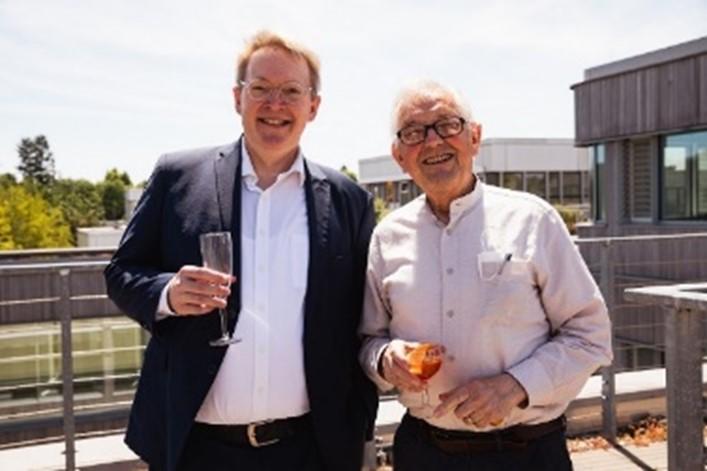
J. Cale Johnson and Prof. Dr. em. Johnannes Renger, head of the Institute of Ancient Near Eastern Studies until 2002, Freie Universität Berlin
After the lectures, guests and staff gathered for a garden party in the institute’s villa at Arnimallee 10. The Arnimallee was named after Johann Friedrich Bernd von Arnim, who was Prussian Minister of State and Agriculture from 1906 to 1910. After the Second World War, the newly founded Freie Universität Berlin took over numerous villas, including house number 10, formerly owned by the Hecht family, whose villa next door at number 8 remains the only privately owned house in the center of the university district.
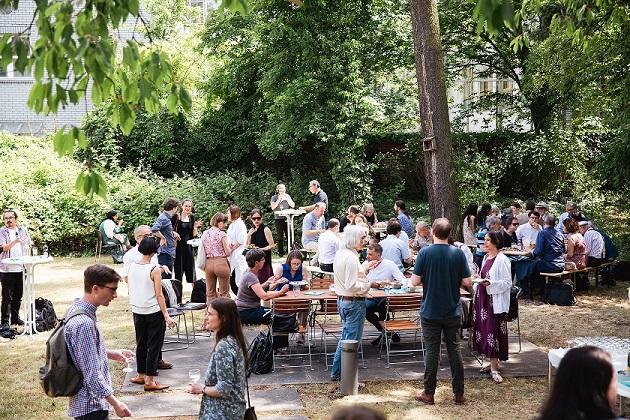
Garden of the insitute in Arnimallee 10
.

The food was provided by Naya Jouly, a restaurant and caterer specializing in Levantine food right next to the university’s Rost- and Silberlaube. A research assistant at the institute worked tirelessly to ensure the right mix of drinks.
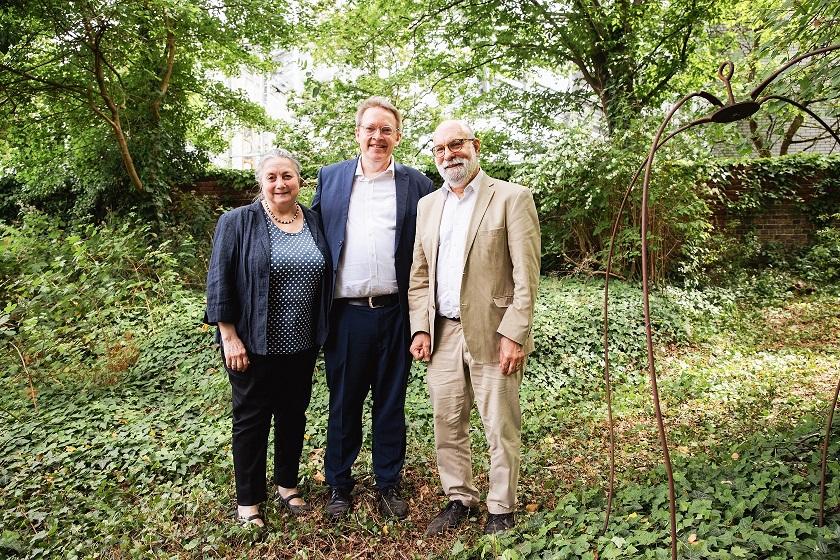
J. Cale Johnson with Florentina Badalanova-Geller (left), Professor at the TOPOI Cluster of Excellence until 2018, and Markham J. Geller (right), Professor for the History of Knowledge and PI of the ERC-Projects Babmed – Babylonian Medicine, until 2018, Freie Universität Berlin.
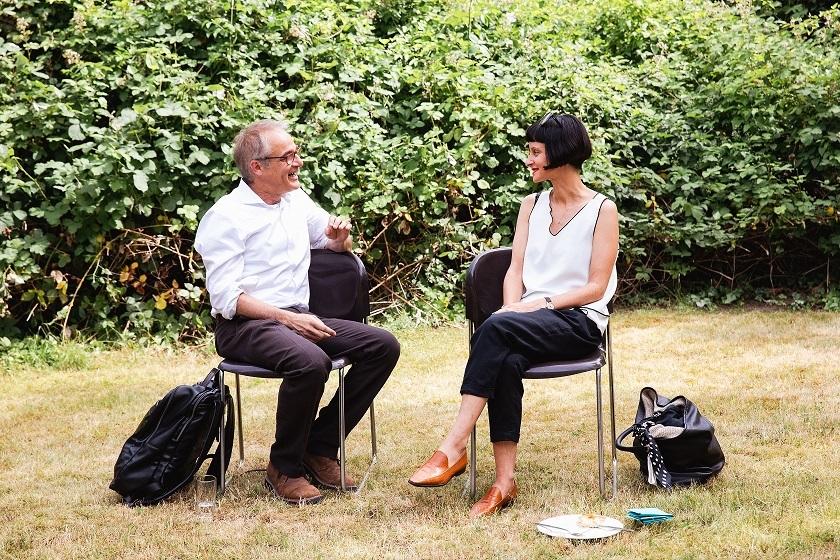 Karola Prutek (Technischen Universität Berlin) in conversation with Matteo Valleriani (Max-Planck-Institut für Wissenschaftsgeschichte).
Karola Prutek (Technischen Universität Berlin) in conversation with Matteo Valleriani (Max-Planck-Institut für Wissenschaftsgeschichte).
Mathieu Ossendrijver, PI of the ERC-Project ZODIAC – Ancient Astral Science in Transformation
Mathieu Ossendrijver is the Principal Investigator of the ZODIAC research project; he is a historian of ancient science, Assyriologist and astrophysicist. From 2013 to 2018 he taught as a professor for the history of science in antiquity at the Humboldt University in Berlin. His research interests include Babylonian astral science (astronomy, astrology) and mathematics, institutional, social and other contextual aspects of Babylonian science, and cross-cultural knowledge transformations between Babylonia and neighboring cultures such as those of Egypt and the Greco-Roman world.
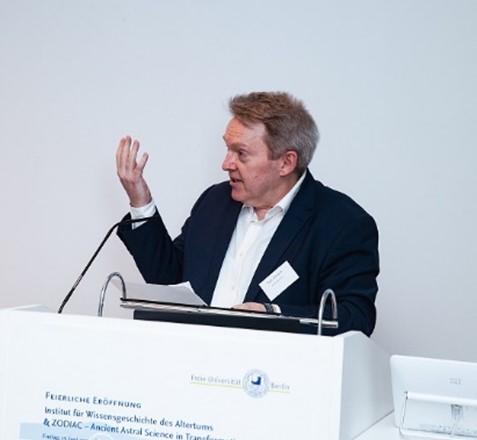
J. Cale Johnson, head of the Institute for the History of Knowlege in the Ancient World
In 2020, J. Cale Johnson took up the professorship for Ancient History of Knowledge at the Free University of Berlin. He studied Assyriology, comparative Semitic languages, linguistics and linguistic anthropology at the University of California, Los Angeles, and Kyoto University. He had also conducted research in Berlin over several previous stays, at the Institute for Ancient Near Eastern Studies, the TOPOI Cluster of Excellence and the Collaborative Research Center Episteme in Motion, and he was also deputy head of the ERC research project BabMed – Babylonian Medicine. Johnson taught Assyriology at the Universiteit Leiden and the University of Birmingham. His research focuses on proto-cuneiform and the origin of writing, Sumerian literature and grammar, and Babylonian medicine.
